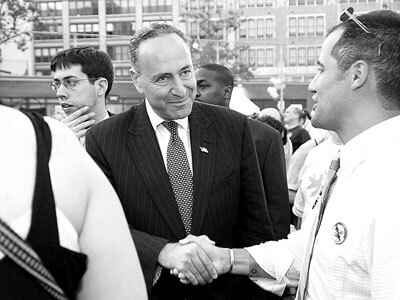At Garden Party, senator says gay foes don’t have two thirds support in Senate
New York Sen. Charles Schumer expressed confidence this week that the Federal Marriage Amendment (FMA) to the Constitution, limiting marriage to couples of one man and one women, which needs a two-thirds majority to clear the Senate, will not only fall short when the Republicans bring it to the floor on July 12, “but we are close to getting a majority” in opposition.
Only forty nay votes are necessary to stop it from coming to the floor for a vote, after which supporters of the effort need 67 votes to send the amendment on to the 50 states if the House also approves it by a two-thirds margin. Three-quarters of the state legislatures would then have to approve it for it to become part of the Constitution.
Speaking at the LGBT Community Center Garden Party on Monday, Schumer said, “Senator Clinton and I are totally dedicated to defeating this amendment.”
New York’s senior senator was enthusiastically received by the crowd despite his 1996 vote for the Defense of Marriage Act (DOMA), banning federal recognition of same-sex marriages and empowering the states to deny full faith and credit to legal gay marriages performed in other states. Schumer and Clinton still oppose the right of same-sex couples to marry, though both have expressed support for civil unions that grant gay people benefits equivalent to those conferred by marriage.
Schumer sits on the Senate Judiciary Committee where he has been the leader in the fight against right-wing extremists appointed to federal judgeships. That committee, chaired by Republic Orrin Hatch of Utah, held a hearing on the FMA on Tuesday, even though the Republican leadership is determined to bring the amendment to the floor without a committee vote before the Democratic National Convention in order to force Democrats, like presidential candidate John Kerry, to take a stand.
Kerry, who voted against DOMA, publicly opposes the federal amendment, but supported the Massachusetts state constitutional amendment approved, in the first of several required steps, by state legislators that bans same-sex marriage while simultaneously conferring all the rights of marriage to gay couples through civil unions. To become part of the Massachusetts Constitution, the Legislature must approve the exact same language when it next meets in joint constitutional convention in 2006 at which point it would go before the voters that November. Right-wing groups are also working on gathering signatures for an amendment that would simply ban same-sex marriage while granting no compensating rights to gay couples, but such a measure could not get on the ballot before 2008.
The Boston Globe reported that it is “uncertain” whether Kerry would return to Washington to vote against the Federal Marriage Amendment. Told about Senate Majority Leader Bill Frist’s (R-Tenn.) plan to bring it to the floor in July, Kerry called the timing “pretty political.”
The House seems less inclined to vote on the amendment this summer, whose Majority Leader Tom Delay (R-Tex.) told The New York Times that “he did not want to bring up the amendment for a vote until he was certain it would pass and urged the Senate to do the same.”
At the Judiciary Committee hearing this week, Hatch voiced a sense of urgency about saving the United States from the “imposed experiment” of same-sex marriage launched by the “infamous case” decided four to three by the “activist judges” of the Supreme Judicial Court in Massachusetts last November. He noted that a “Florida lawyer” (who actually has a record of anti-gay activism) has brought a federal challenge to DOMA and that Kerry said in 1996 that “DOMA does violence to our Constitution.”
Ranking Democratic Sen. Patrick Leahy of Vermont bitterly complained that the Judiciary Committee has virtually ignored issues such as terrorism and problems at the FBI, instead conducting “four hearings in the last ten months,” in the committee and one of its subcommittees on the amendment. He and other Democrats were especially upset that the process of trying to amend the constitution was moving forward without subcommittee or committee votes or a chance to mark up the bill. Leahy also noted, “The Department of Justice has refused to testify before us on the language of the amendment.”
Pres. George W. Bush, who favors the amendment, also will not respond to Leahy’s requests for comment on the language.
The amendment, authored by Rep. Marilyn Musgrave of Colorado, now reads: “Marriage in the United States shall consist only of the union of a man and a woman. Neither this Constitution or the constitution of any state, nor state or federal law, shall be construed to require that marital status or the legal incidents thereof be conferred upon unmarried couples or groups.”
There was much debate in the committee about whether the amendment’s clause about “legal incidents” would invalidate domestic partnerships and civil unions. Musgrave says that it forbids judges from construing the U.S. or state Constitutions to confer those benefits, but that legislatures were still free to confer any rights it wanted on gay couples except marriage itself. One of the Democratic lines of argument is that the amendment overreaches and would indeed jeopardize domestic partnerships.
The star witness for the Republicans was Gov. Mitt Romney of Massachusetts, the state that just opened marriage to same-sex couples on May 17—though the governor is doing all he can to limit the licenses to in-state couples. In his testimony, the governor, who is Mormon, said, “Marriage isn’t solely for adults, but for the nurturing of children” and that “the children of America have a right to a mother and a father.” No one asked him if he favored barring gay people from having or adopting children, even though he insisted, “Scientific studies of children raised by same-sex parents are almost non-existent.”
Musgrave quoted from the Bible in her testimony and said it is “it is a self-evident fact that men and women complement one another.” She said it is “impossible” for a man to marry a man or a woman to marry a women. And she callenged the idea that the federal government doesn’t amend the Constitution to overrule the states, citing the 13th Amendment, banning slavery, which she called “antithetical” to the American people, just as she claims same-sex marriage is.
The only witness called to oppose the amendment was former Rep. Bob Barr of Georgia, the author of DOMA, who said that the 1996 measure was a good and constitutional law and ought to be given a chance before conservatives rush to amend the federal constitution. He noted that most states have moved to ban same-sex marriage and that it was not Congress’ intention in 1996 to stop individual states from sanctioning it, only to ban federal recognition of gay marriages and give the states the right not to recognize gay marriages performed in other states.
Barr said that Romney was essentially asking Congress to protect Massachusetts from itself. If DOMA were to be struck down, Barr said, “the people won’t stand idly by and let this [same-sex marriage] be shoved down their throats.” He also diagreed with Justice Antonin Scalia’s opinion that the 2003 Lawrence decision striking down sodomy statutes made judicial approval of same-sex marriage inevitable.
“So many people who voted for DOMA have so little faith in it,” Barr said.
The American Family Association has called for “Marriage Protection Sunday” on July 11 and “Call Your Senator Day” on the July 12 to push for the amendment. While most religious conservatives acknowledge they haven’t gotten much traction on this issue in the pews, Sen. Sam Brownback (R-Kan.), a staunch foe of same-sex marriage, told the Washington Post, “the faith community is not focused on D.C. yet. It’s going to when we get a constitutional amendment up for a vote.”
The Congressional Budget Office released a study this week that found that the federal government would save close to a billion dollars annually if same-sex couples were allowed to marry. The study found that though some expenditures, such as Social Security, would go up, the costs to the government associated with uninsured partners in same-sex relationships would decline, more than compensating for the increases.

































